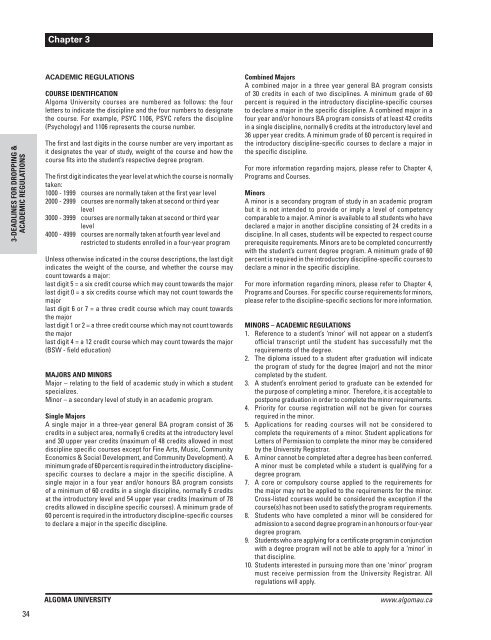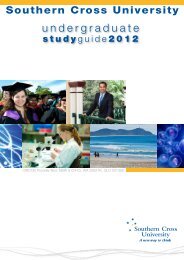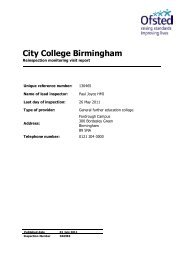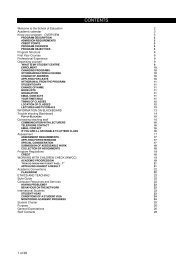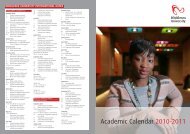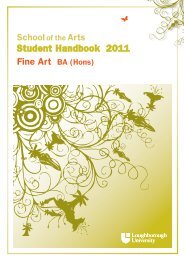You also want an ePaper? Increase the reach of your titles
YUMPU automatically turns print PDFs into web optimized ePapers that Google loves.
Chapter 3<br />
3-DEADLINES FOR DROPPING &<br />
ACADEMIC REGULATIONS<br />
34<br />
ACADEMIC REGULATIONS<br />
COURSE IDENTIFICATION<br />
Algoma University courses are numbered as follows: the four<br />
letters to indicate the discipline and the four numbers to designate<br />
the course. For example, PSYC 1106, PSYC refers the discipline<br />
(Psychology) and 1106 represents the course number.<br />
The first and last digits in the course number are very important as<br />
it designates the year of study, weight of the course and how the<br />
course fits into the student’s respective degree program.<br />
The first digit indicates the year level at which the course is normally<br />
taken:<br />
1000 - 1999 courses are normally taken at the first year level<br />
2000 - 2999 courses are normally taken at second or third year<br />
level<br />
3000 - 3999 courses are normally taken at second or third year<br />
level<br />
4000 - 4999 courses are normally taken at fourth year level and<br />
restricted to students enrolled in a four-year program<br />
Unless otherwise indicated in the course descriptions, the last digit<br />
indicates the weight of the course, and whether the course may<br />
count towards a major:<br />
last digit 5 = a six credit course which may count towards the major<br />
last digit 0 = a six credits course which may not count towards the<br />
major<br />
last digit 6 or 7 = a three credit course which may count towards<br />
the major<br />
last digit 1 or 2 = a three credit course which may not count towards<br />
the major<br />
last digit 4 = a 12 credit course which may count towards the major<br />
(BSW - field education)<br />
MAJORS AND MINORS<br />
Major – relating to the field of academic study in which a student<br />
specializes.<br />
Minor – a secondary level of study in an academic program.<br />
Single Majors<br />
A single major in a three-year general BA program consist of 36<br />
credits in a subject area, normally 6 credits at the introductory level<br />
and 30 upper year credits (maximum of 48 credits allowed in most<br />
discipline specific courses except for Fine Arts, Music, Community<br />
Economics & Social Development, and Community Development). A<br />
minimum grade of 60 percent is required in the introductory disciplinespecific<br />
courses to declare a major in the specific discipline. A<br />
single major in a four year and/or honours BA program consists<br />
of a minimum of 60 credits in a single discipline, normally 6 credits<br />
at the introductory level and 54 upper year credits (maximum of 78<br />
credits allowed in discipline specific courses). A minimum grade of<br />
60 percent is required in the introductory discipline-specific courses<br />
to declare a major in the specific discipline.<br />
ALGOMA UNIVERSITY<br />
Combined Majors<br />
A combined major in a three year general BA program consists<br />
of 30 credits in each of two disciplines. A minimum grade of 60<br />
percent is required in the introductory discipline-specific courses<br />
to declare a major in the specific discipline. A combined major in a<br />
four year and/or honours BA program consists of at least 42 credits<br />
in a single discipline, normally 6 credits at the introductory level and<br />
36 upper year credits. A minimum grade of 60 percent is required in<br />
the introductory discipline-specific courses to declare a major in<br />
the specific discipline.<br />
For more information regarding majors, please refer to Chapter 4,<br />
Programs and Courses.<br />
Minors<br />
A minor is a secondary program of study in an academic program<br />
but it is not intended to provide or imply a level of competency<br />
comparable to a major. A minor is available to all students who have<br />
declared a major in another discipline consisting of 24 credits in a<br />
discipline. In all cases, students will be expected to respect course<br />
prerequisite requirements. Minors are to be completed concurrently<br />
with the student’s current degree program. A minimum grade of 60<br />
percent is required in the introductory discipline-specific courses to<br />
declare a minor in the specific discipline.<br />
For more information regarding minors, please refer to Chapter 4,<br />
Programs and Courses. For specific course requirements for minors,<br />
please refer to the discipline-specific sections for more information.<br />
MINORS – ACADEMIC REGULATIONS<br />
1. Reference to a student’s ‘minor’ will not appear on a student’s<br />
official transcript until the student has successfully met the<br />
requirements of the degree.<br />
2. The diploma issued to a student after graduation will indicate<br />
the program of study for the degree (major) and not the minor<br />
completed by the student.<br />
3. A student’s enrolment period to graduate can be extended for<br />
the purpose of completing a minor. Therefore, it is acceptable to<br />
postpone graduation in order to complete the minor requirements.<br />
4. Priority for course registration will not be given for courses<br />
required in the minor.<br />
5. Applications for reading courses will not be considered to<br />
complete the requirements of a minor. Student applications for<br />
Letters of Permission to complete the minor may be considered<br />
by the University Registrar.<br />
6. A minor cannot be completed after a degree has been conferred.<br />
A minor must be completed while a student is qualifying for a<br />
degree program.<br />
7. A core or compulsory course applied to the requirements for<br />
the major may not be applied to the requirements for the minor.<br />
Cross-listed courses would be considered the exception if the<br />
course(s) has not been used to satisfy the program requirements.<br />
8. Students who have completed a minor will be considered for<br />
admission to a second degree program in an honours or four-year<br />
degree program.<br />
9. Students who are applying for a certificate program in conjunction<br />
with a degree program will not be able to apply for a ‘minor’ in<br />
that discipline.<br />
10. Students interested in pursuing more than one ‘minor’ program<br />
must receive permission from the University Registrar. All<br />
regulations will apply.<br />
www.algomau.ca


